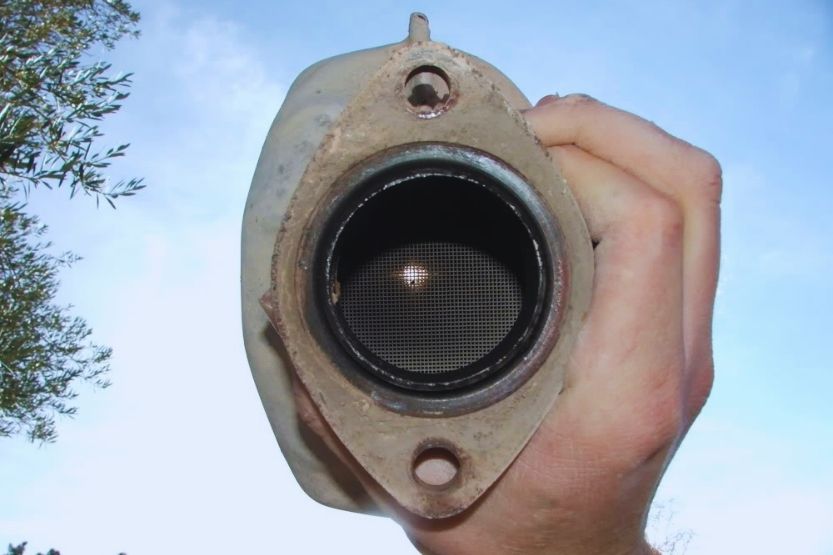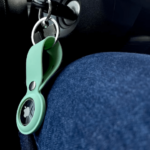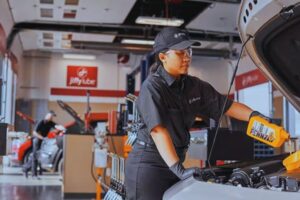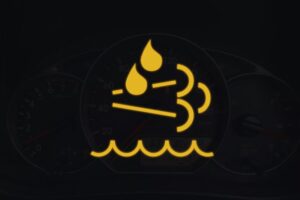Does it ever bug you when your car makes strange noises? Do you know what to do if your car makes a humming noise? Do you ever wonder why this humming noise in your car gets louder with speed?
When you hear a humming noise in your car that gets louder as you drive, it’s often due to damaged wheel bearings. A lack of lubrication or cavitation usually causes this, and replacing the bearings would do it all. However, that is not the end of the story. There are other factors as well that may contribute to the noise.
The good news is that we’ve done our homework and we will show you how to solve this problem once and for all.
So, read on to learn more about what causes this humming noise in the first place, why it gets louder as you drive faster and what you can do to fix it. Let’s dive in!
Humming Noise in Car Gets Louder With Speed

Bad Wheel Bearings Due to Insufficient Lubrication
When you start driving and suddenly hear a relatively strong bass-like hum, it’s often due to bad wheel bearings caused by a lack of lubrication or cavitation.
On the other hand, other issues that might cause this problem include the following:
- A damaged CV joint,
- A Cracked serpentine belt,
- Catalytic converter,
- Bad ball joints, and
- Cylinder compression, among others.
Sure, noises are, after all, a part of driving, and some are common when accelerating, but when things start to seem or sound off, you should always follow your instincts. Your car engine is a well-tuned piece of machinery.
It produces noise beneath the hood, but it’s usually predictable and quiet. When you press the accelerator pedal, the engine accelerates. When you let go, the engine slows to a smooth idle. You can always tell when something isn’t right.
Excessive Noise Is a Sign of a More Serious Problem
Excessive noise in your car can sometimes indicate a more severe problem, such as malfunctioning knots. As you change into the manual transmission, these knots cause gear grinding and an irritating humming.
Meaning of Low-pitched Humming
On the other hand, a low-pitched humming could suggest worn joints or a defective wheel bearing. It all starts with a slow run up to 30 to 40 mph. To determine the source, look at the clutch or transmission.
Causes of Humming Noise While Driving
1. Worn Wheel Bearings
Ensure That Your Car’s Wheels Freely Spin as You Drive
Wheel bearings ensure that your car’s wheels freely spin as you drive along the road. You can find these bearings within a unitized hub, which must be replaced if the bearings inside begin to wear.
On the other hand, many older cars had individual wheel bearings that you could remove and grease whenever necessary. Regardless of what type of wheel bearing we are talking about, they wear out with time.
Causes Humming Noise
A badly worn wheel bearing will generate a humming noise, and the pitch of this noise will also change as you speed down the road. When played at a high pace, this sound is similar to a whirring or whining noise.
Immediately Replace with New Ones
Ideally, you should change excessively worn or damaged wheel bearings as soon as possible. Failure to do so will further wear and tear, worsening the problem.
When a wheel bearing’s cage reaches a point of total failure, the rollers within it might unseat and disengage, paving the way for a dangerous free-play within your car’s hub.
Can Cause a Hub to Come Loose from Its Spindle
A significantly worn wheel bearing can cause a hub to come loose from its spindle in extreme circumstances. This is a difficult situation resulting in a collision or badly damaged wheel-end components.
2. Cracked or Dry Serpentine Belt
Powers Various Components Critical to the Vehicle’s Operation
Your car’s serpentine belt powers various components critical to the vehicle’s operation. It only functions well when it is in good condition.
Can Result in Belt Slippage
It starts to dry up and break over time, so the belt cannot grip the pulleys of the different accessories it drives as well as it would like. This could result in belt slippage, which becomes increasingly severe over time.
The friction created when a serpentine belt slips around the outer diameter of various pulleys can cause this humming noise that becomes louder as your car speeds up. This added friction can exacerbate the wear on an already worn serpentine belt.
The whining or squealing of a serpentine belt is often more of an irritation than anything else, and it poses minimal risk of causing more problems if not handled right once.
Very Torn Serpentine Belt Can Snap or Be Flung Off the Pulleys
A very torn serpentine belt, on the other hand, can snap or be flung off the pulleys on which it travels. All belt-driven attachments will be rendered inoperable, leaving you stranded in the middle of the road.
3. Damaged CV Joint
When you have a faulty inner CV joint, you may hear a hum under the car. As your car speeds up, the noise becomes louder. You can hear it as you spin, even though it sounds like a crackling.
The following factors can cause CV joints to hum:
- Poor lubricant applied or no lubrication at all
- Age-related and aggressive driving habits
- Severe CV joint wear
4. Car Oil
Faulty car oil or a lack of oil in the engine can cause hum noise while driving. If you have bad motor oil, it is recommended that you take your car to a specialist who will look into it.
However, if there is an oil scarcity, you can take the following steps:
- Look for the hood of your car, and then release and open it.
- Use a clean rag to lift and wipe clean the dipstick.
- Replace the dipstick and remove it.
- Then double-check your oil level to ensure it is correct.
- You can add more oil as needed, but you must be careful not to overfill the container and only use the recommended amount.
5. Transmission Issues
Plays a Vital Role in Transmitting Engine Power to the Drive Axles
Your car’s transmission plays a vital role in transmitting engine power to the drive axles of your car. Transmissions, however, are prone to internal breakdown as time goes by.
This type of failure can cause an audible humming noise in some situations. Noises like this can be tough to track down, especially if they’re coming from your car’s transmission tunnel, which is usually a sign of a fluid problem.
Low Transmission Fluid Level
When a transmission’s fluid level is dropped beyond capacity or a transmission fluid pump begins to fail, you hear this humming noise.
Faulty Torque Converter
A faulty torque converter can also cause this roaring noise at high speeds. The onset of a humming noise coming from your car’s transmission is usually a serious problem. The replacement of a damaged torque converter will involve transmission removal.
Repair Cost
The cost of such repairs is high, exceeding $1000 in most cases. If a deteriorating internal bearing causes your transmission’s noise problem, the cost of repair will be significantly higher.
6. Catalytic Converter

You’ll have to physically inspect the catalytic converter to see if it’s the source of the humming noise. While you’re under your car, have someone rev the engine.
Inspect the muffler system under the engine before moving on to the catalytic converter. The converter resembles a woven basket with a tangle of wires. Rust in the converter can potentially be the cause of the noise.
Again, what causes a humming noise in a car that gets louder with speed? A bad wheel bearing is the common cause of a humming noise in a car that gets louder with speed. A bad wheel bearing results from cavitation or lack of lubrication.
7. Engine
A problem that happens right in the engine part could be the source. It all depends on the type of car and engine you have. We recommend getting a comprehensive car engine system checkup to ensure quality and proper fitment.
In the meantime, these are common engine problems that can result in a humming noise:
Leakage
Either the exhaust system or the power steering system may leak. Even though they are both leaks, you can’t deal with them in the same way. If you spot a leak in either of these two areas after a thorough engine system inspection, act quickly to stop the leak.
Loose Belt
Belts are essential to driving your car’s tires. However, belts can get loosen and generate a humming or buzzing noise in the engine over time.
Faulty Power System
Two types of defects can occur in a car’s engine power system. The first is a malfunctioning power steering system, while the second carries low fluids. In either case, you will need professional assistance to do the task properly.
8. Damaged Water Pump Bearing
You will hear a hum in the engine compartment if the water pump bearing is worn out. If it’s partially failed, the engine temperature will be higher than usual, including the coolant temperature.
9. Bad Ball Joints
Ball joints are another common source of humming noises. A worn ball joint causes your car to make a crunching noise when driving or, more typically, a clicking noise at the start of every turn.
Regardless of how inconvenient they are, they are quite easy to repair and drastically improve the performance of your car.
10. Uneven Tire Wear
Unevenly worn tire treads can also cause these strange noises. Tire cupping, also known as scalloping, is a sort of uneven wear that causes humming noises at high speeds and is sometimes misdiagnosed as a faulty wheel bearing.
Scallops do form around the tread in this type of wear, which indicates an out-of-balance wheel but more typically signals the need to repair worn shock absorbers or other suspension components.
Causes of an Uneven Tire Wear
The major causes of uneven tire wear include:
- Unbalanced wheels,
- Incorrect wheel alignment,
- Overinflated or underinflated tires, and
- Worn suspension or steering elements.
You will experience uneven tire wear if you install low-cost brand tires in your car.
These tires may use inferior materials such as rubber that is more prone to uneven wear, steel belts that are less supportive of the tread, etc., making them more prone to cupping.
11. Steering Issues
When the steering wheel in your car is not in a neutral position, it can make a buzzing or humming noise. To solve the problem, you should look for alignment issues in the car.
In addition, a loosened steering belt that becomes slack over time can also cause this humming noise when accelerating.
12. Worn Out Rear-axle Reducer
A worn-out rear axle reducer can generate a humming noise in a rear-wheel-drive or all-wheel-drive car, especially if the noise comes from the back. In some cases, the sound is louder, such as when a wheel bearing is destroyed or when the transmission oil level is low.
13. Cylinder Compression
When you start the engine, the air and fuel mix in a specific ratio, and the spark plug ignites the fuel, which starts the car. It creates a stir. It could be a cylinder compression issue if you find the engine humming louder than usual when you accelerate.
High Compression Results in Loud Noise
Your car will produce a loud noise when the compression is high. A car will not start in one go if the compression is low, and it may misfire.
Causes of Low Compression
A damaged head gasket can produce low compression by releasing the gas and leaking the fuel. Pistons can also produce poor compression by causing holes in them due to heat.
Then, there is the issue of valves. When you get carbon deposits adhered to the valves, you will have carbon clogs, resulting in significant compression. Healthy valves are the only solution in such a case.
Hire a Professional Mechanic
You can figure out the problem based on the noises, and if you can replace the defective parts yourself, that’s great. However, it is highly recommended that you hire a professional instead of doing it yourself.
How to Fix Loud Humming Noises in Your Car

1. Replace the Wheel Bearings
You will probably have to disassemble the car thoroughly to get to the bearings.
Because replacing a wheel bearing is a relatively simple procedure, you should be able to get an exact price over the phone by providing the year, make, and model of your car. Getting a few quotes before picking a company to fix your wheel bearing is good because pricing can vary greatly.
2. Repair Other Suspension Components
These components include the lower ball joint or tie rod end, as they can get damaged during removal if they are old or worn.
Above all, it is essential to replace the bearing as soon as possible because you never know how long it will be able to support your car.
3. Make Sure to Inflate the Tires Properly
Overinflated or underinflated ones will cause some noises.
4. Check the Wheels’Alignment
Misaligned wheels can cause a humming noise as you speed up.
5. Follow the Car Inspection Schedule
Maintain the condition of your car and attend every scheduled car inspection and tire service.
6. Buy Tires from a Reputable Retailer
Only buy and replace your tires from a reputable retailer and make sure you properly align the tires.
7. Get Help from a Professional Mechanic
Do not attempt to repair the car yourself unless you know what you are doing.
Always seek assistance from a reputable mechanic or a local auto shop. They can analyze, diagnose, and devise a plan to save your car with their assistance.
Additional Tip
Always pay close attention to your car. Yes, noises are a part of driving but don’t ignore them if you hear something unexpected. It may or may not be a small problem. Pay attention to its sound and try to find out what it is.
Conclusion – Loud Humming Noise at High Speeds
So, are noises a part of driving? Yes, but when you constantly hear a humming noise, and it gets louder as you drive, this is not something to ignore. It’s usually due to faulty wheel bearings, and you will have to deal with the problem as soon as possible.
You will also need to pay attention to any damaged CV joints, poor ball joints, cracked or dry serpentine belts, catalytic converters, and cylinder compression that can be the underlying cause of the noise.
Cars are sophisticated and complicated machines, but you should always trust your instincts when things start to feel or sound strange. We hope you found this helpful article. You should know how to identify the source and how to fix it.
Sure, things can be complex enough, especially if you’re a novice car owner or driver who doesn’t know your car inside and out.
As such, make sure you schedule regular auto maintenance and checkups to maintain your car in tip-top shape and guarantee no noise causes you to pull over to the side of the road.
Remember always to seek assistance from a trained mechanic and allow them to deal with the problem and identify the source of the humming noises.
Read next:
Brake Noise When Braking Slowly
9 Possible Causes and How to Fix Grinding Noise When Braking

![Noise When Braking at Low Speed [Causes and How To Fix] noise when braking at low speed](https://roadsumo.com/wp-content/uploads/2021/07/noise-when-braking-at-low-speed-150x150.jpg)

![Kawasaki Ninja 250 Top Speed [How Fast Can It Go?] kawasaki ninja 250 top speed](https://roadsumo.com/wp-content/uploads/2022/06/Kawasaki-Ninja-250-top-speed-150x150.jpg)





